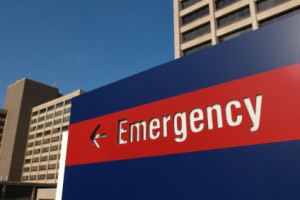When I often think of uncertainty, chaos and unpredictability, the Emergency Room of a hospital comes to mind. I sat down with someone who knows how to handle chaos and unpredictability in the Emergency Room, namely Dr. Rahul Sharma whom I met recently through a common friend.
 Back in November of 2009, Dr. Sharma became famous because he and Dr. Flavio Gaudio saved someone’s life in a dramatic fashion. They were in the Emergency Room of New York Presbyterian Hospital attending to their duties when Joe Taralosi walked in and dropped to the floor with a massive heart attack. With great passion and persistence they attempted to revive Joe by giving him 4,500 chest compressions and 8 shocks of the defibrillator.
Back in November of 2009, Dr. Sharma became famous because he and Dr. Flavio Gaudio saved someone’s life in a dramatic fashion. They were in the Emergency Room of New York Presbyterian Hospital attending to their duties when Joe Taralosi walked in and dropped to the floor with a massive heart attack. With great passion and persistence they attempted to revive Joe by giving him 4,500 chest compressions and 8 shocks of the defibrillator.
Forty seven minutes later, they brought Joe back to life. That’s almost an hour!!! This guy was gone but they didn’t give up and brought him back. Joe recovered and has been widely talked about in the media as a great story. See more here.
After Dr. Sharma shared this remarkable story of managing such intense chaos and uncertainty with me, I was curious about how a highly trained Emergency Room doctor handles the stress and chaos. So I asked him, “How do you face uncertainty, unpredictability and total chaos in the ER when you’re confronted with having a human life on the line?” As a lesson for me on how to deal with anxiety and stress related to uncertainty.
“You act fast. You don’t think. You act. Do something. Anything”, he told me. “Did you ever hear of the Golden Hour?”, he asked. With much eagerness and curiosity, I leaned in and asked him to explain. And what I learned was very interesting, especially as it relates to our everyday life of attempting to overcome stress and anxiety trying to deal with all of this uncertainty and unpredictability.
The Golden Hour
Wikipedia definition: “In emergency medicine, the golden hour refers to a time period lasting from a few minutes to several hours following traumatic injury being sustained by a casualty, during which there is the highest likelihood that prompt medical treatment will prevent death.[1] It is well established that the victim’s chances of survival are greatest if they receive care within a short period of time after a severe injury. Some have come to use the term to refer to the core principle of rapid intervention in trauma cases, rather than the narrow meaning of a critical one-hour time period.”
Dr. Sharma explains, “The emergency room is full of chaos. We see everything from gunshot victims, heart attacks and broken bones. What we realize in all of that unpredictable chaos is that we need to focus on what’s really important and move quickly because time is ticking down.” It seems to me that the golden rule says that it isn’t as important WHAT you do but what’s more important is that YOU DO IT. FAST. You try something – usually the typical course of action for a given diagnosis. But TIMING is key here. You need to act fast because the chances of survival are greatest early on.
How does the Golden Hour help me to Embrace the Chaos?
What I realized in speaking with an ER doctor is that as I learn to live in a new economy where jobs, careers, education and life feels highly uncertain, I have to act fast with the actions I take. I have to Say YES and DO NEW THINGS (Rule #2). And do these things quickly! Sitting around and waiting for things to happen will only cause more uncertainty because nothing happens when you don’t do anything. You get stuck in limbo land. You feel even more afraid of all the negative consequences that you play out in your mind about a course of action that you haven’t even taken. So, you wait and wait and wait. But what happens is that you lose time. And lost time is lost opportunity.
What the golden rule of emergency medicine teaches me is that by acting fast, I gain precious time because I’ve taken an action – any action…it really doesn’t matter which action because by taking action, I’ll find out more quickly if it is a good choice or a bad one. At least I’ll get a result of some sort.
By trying new things, new experiences and new ideas and ACTING FAST, I believe it will make me feel better because at least I would have given something a shot. And while I realize that the “Golden Hour” in emergency medicine is not about saving my life, I do believe that it might actually help me with something just as meaningful: saving my sanity.
Rule #2: Say YES and DO New Things. Embrace the Chaos!
-Bob Miglani
